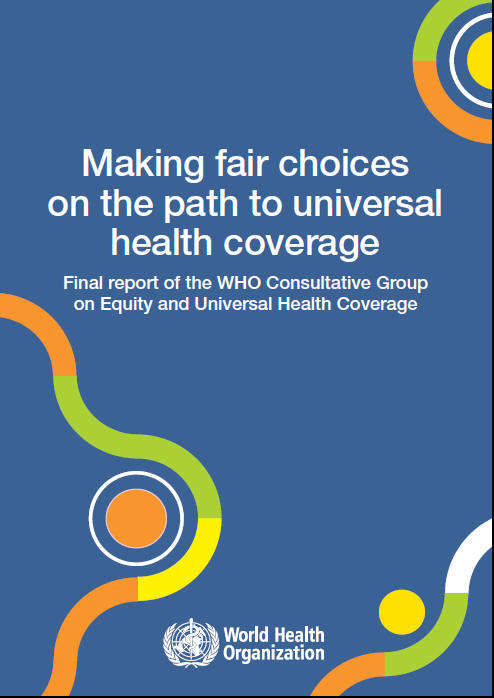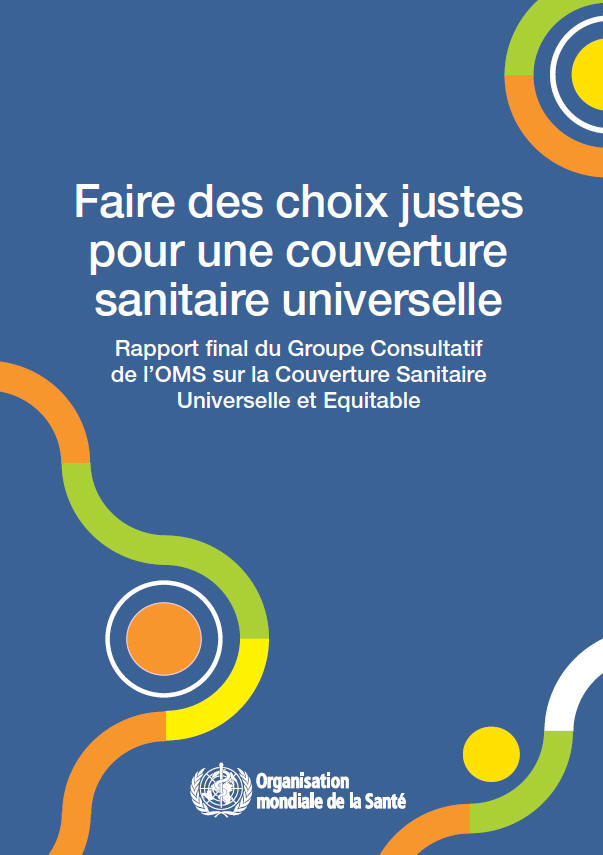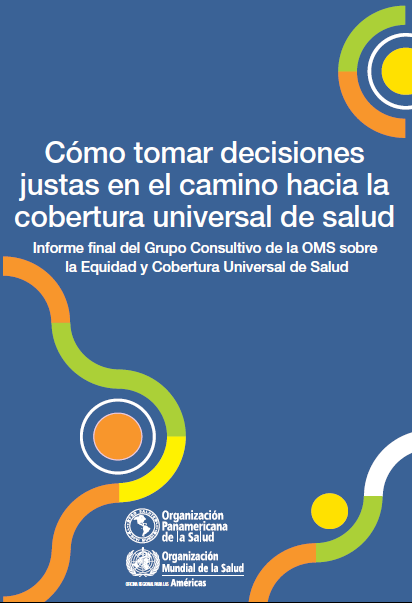
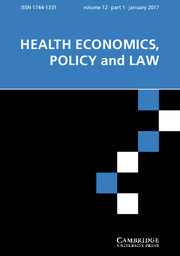
![]()
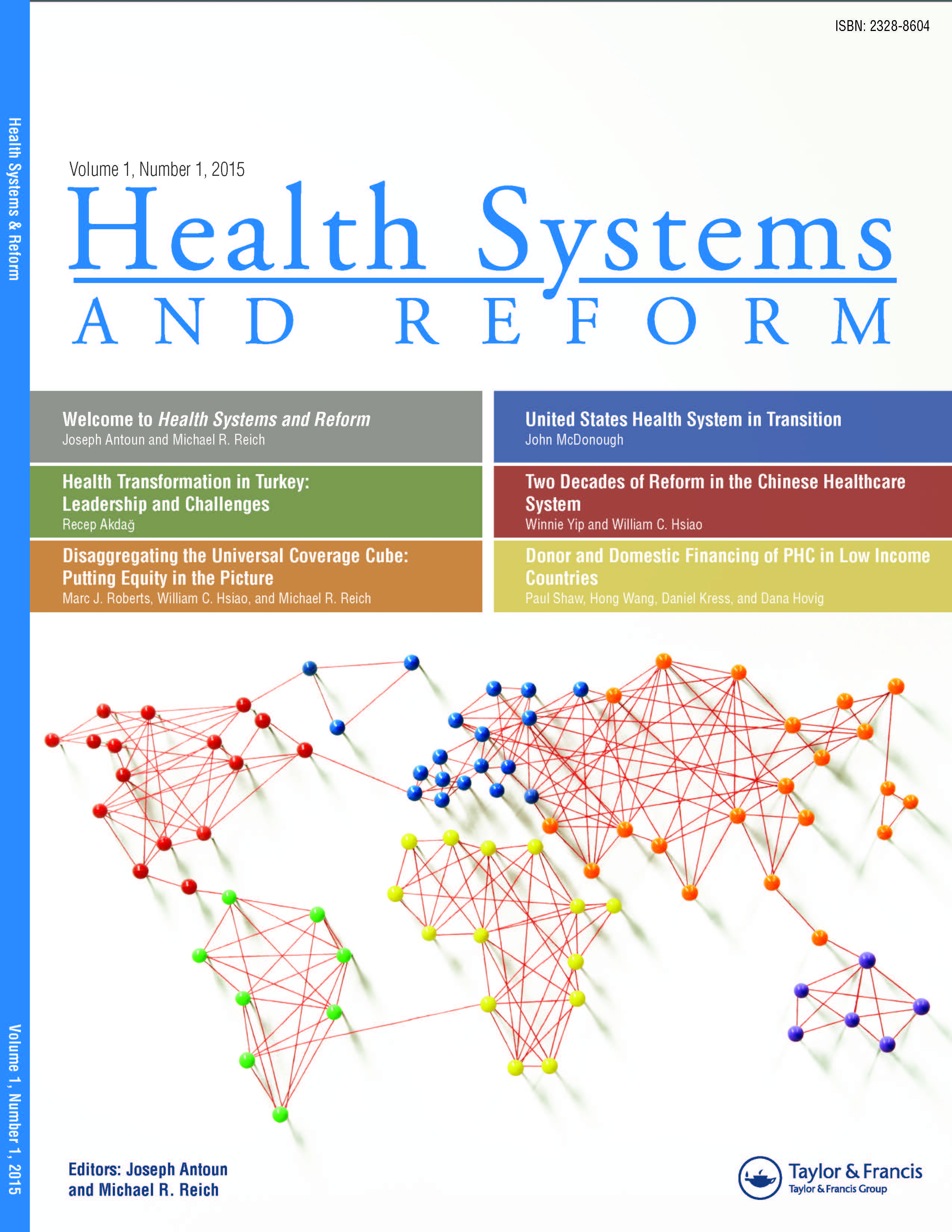
Making Fair Choices
on the Path to Universal Health Coverage
Members of the WHO Consultative Group:
Trygve Ottersen,* Ole F Norheim,* Bona M
Chitah, Richard Cookson, Norman Daniels,
Frehiwot B Defaye, Nir Eyal, Walter Flores, Axel
Gosseries, Daniel Hausman, Samia A Hurst, Lydia
Kapiriri, Toby Ord, Shlomi Segall, Gita Sen,
Alex Voorhoeve, Daniel Wikler, Alicia E Yamin
WHO staff:
Tessa T T Edejer, Andreas Reis, Ritu Sadana,
Carla Saenz
* Lead authors
Countries around the world are moving towards Universal Health Coverage. Along the way, they face difficult choices. The WHO Consultative Group on Equity and Universal Health Coverage has produced a report to offer guidance on how to make these choices fairly, which you can access:
This website presents the Group’s recommendations and offers a record of the impact of the report.
We welcome feedback; one of the Report's authors is Alex Voorhoeve, e-mail < a dot e dot voorhoeve at-sign lse dot ac dot uk>.
Central ideas
The report advises that, to progressively achieve UHC, countries must advance in at least three dimensions: they must expand priority services, include more people, and reduce out-of-pocket payments. In each of these dimensions, they face a critical choice in terms of which services to expand first, whom to include first, and how to shift from out-of-pocket payment toward prepayment and pooling of funds. The Report recommends a three-part strategy for making these choices fairly and progressively realize UHC:
1. Categorize services into high, medium and low-priority classes using at least three key criteria:
1.1 Health benefit maximization. This involves generating the greatest total health-related well-being gain. For a given budget, one maximizes total health gain by choosing the most cost-effective interventions: the ones that cost the least per unit of health-related well-being gained.
1.2 Extra weight to gains to the worse off. Special consideration should be given to the needs of those who are worse off than others with respect to health prospects and outcomes, access to health services, income and wealth, or social status.
1.3 Fair contribution and financial risk protection. Payments towards necessary coverage and services should align with ability to pay and should be independent of individuals’ health risk profile. Moreover, economic hardship due to health care costs and illness-related loss of income should be minimized.
2. First expand coverage for high-priority services to everyone. This includes eliminating out-of-pocket payments for these services while increasing mandatory, progressive prepayment with pooling of funds.
3. While doing so, ensure that disadvantaged groups are not left behind. These will often include low-income groups and rural populations.
The Report also argued for robust public accountability for priority setting decisions.
These principles for priority setting, and in particular 1.1-1.3, can be seen as an expression of a form of pluralist egalitarianism. This form of pluralism involves giving weight to both utilitarian concerns (with the aim of maximizing total well-being in a population) and egalitarian concerns (with the aim of diminishing inequality by improving the lot of those who are less well off than others). It also involves caring about the distribution of chances of leading a good life (or people’s expected well-being) as well as the distribution of outcomes (people’s well-being outcomes). Finally, it supplements its distributively egalitarian principles—which are concerned with how much well-being people enjoy—with relational egalitarian principles—which are concerned with ensuring that all can enjoy the status of ‘equal citizens’, who are free from domination, exploitation and marginalization. On this egalitarian view, benefits to the worse off receive extra weight because they contribute to two aims of the health system: improving health-related well-being and reducing inequality. (For more on this form of pluralist egalitarianism, see here.)
Policy impact of the report
(1.) Change WHO guidance. Its most important impact has been to place these pluralist egalitarian principles for health coverage design at the heart of the WHO’s guidance and policy advice to member states, and especially to Ministries of Health (MoH), national Bioethics Committees and national Health Technology Assessment (HTA) agencies.
The Report was endorsed in its entirety by the then Director-General of the WHO, Dr. Margaret Chan. The Report is hosted on the WHO-CHOICE website, which is a resource, widely used by member states, to help countries set priorities in health. The WHO-CHOICE project was developed in 1998 with the objective of providing policy makers with evidence for deciding on interventions and programmes which maximize health for the available resources. Its acronym stands for CHOosing Interventions that are Cost-Effective. The Report recommended supplementing this cost-effectiveness criterion with egalitarian criteria for determining which health interventions should be covered by publicly supported health programmes.
The Report is extensively promoted by the WHO and its agencies, in particular the Pan-American Health Organization. It has been presented and thoroughly discussed at several regional meetings of the regional network of HTA agencies, in many regional training sessions on HTA and ethics, and many national meetings, including in Argentina, Bolivia, Chile, Colombia, Costa Rica, Mexico, Peru, Puerto Rico, and Trinidad and Tobago (including the presentation of the guidance and several successive meetings discussing with various stakeholders how to implement the recommendations).
The Report’s principles have also been disseminated to key practitioners and institutions through co-authoring articles that apply its principles to cases with key policy-makers, including the General Director of the Ghanaian Ministry of Health, and staff in the MoH of Burundi, Malaysia, Morocco and Thailand, the WHO, the World Bank, and the Results for Development Institute. The resulting articles (listed below) are used in teaching on priority setting at Bergen, Harvard, LSE, Oslo and in the training of Ethiopian professionals detailed below.
The Report’s principles have been taken up by many key health actors around the world. For example, they are referenced by the Global Vaccine Alliance (GAVI) in its evaluation of its investments in immunization; by the Spanish Academy of Dieticians in its evaluation of dietetic interventions; and by the MoH in Colombia in discussions of priority setting. The Report’s framing of key questions and its principles for priority setting were endorsed in full in Argentina by Prof. Adolfo Rubinstein, first as Secretary of State for Health Promotion, Prevention and Risk Control, and later as Minister of Health. They are also endorsed by Dr. Andrés Pichón Riviere, head of the Argentinian HTA agency in a report he authored on Best Practice for the 2016 Latin-American Forum on HTA.
(2.) Priority setting in Norway. The Report’s principles were followed in an advisory report to the Norwegian government: Open and Fair: Priorities in Health, (which cites the WHO Report). The commission which authored the Norwegian report was led by Prof. Norheim (who was also lead author of the WHO Report). While the precise form of the extra weighting for health benefits to the worse off proposed by the Norheim committee was revised by the Government to a more general “extra consideration” for the worse off, its general approach to priority setting was endorsed by the Norwegian Parliamentary Committee for Health. This pluralist egalitarian approach is now employed by the Norwegian Institute of Public Health, which carries out Health Technology Assessment for the Norwegian government. (The Institute’s Director of Health Services, Dr. Ottersen, was a co-author of the WHO Report.) This report provides an example of such assessment of treatments for multiple sclerosis which cites Open and Fair as the source for its priority setting principles.
(3.) Priority setting and capacity building in Ethiopia. The Reports influenced the Ethiopian government’s decision to ask members of the Consultative Group (led by Prof. Norheim) to advise on a basic package of health interventions for its expansion of health insurance and to provide long-term capacity building in priority setting. To this end, the Ethiopian government, in partnership with the University of Bergen, has set up a Center for Medical Ethics and Priority-Setting at Addis Ababa university, which has provided training there twice per year since 2017. Those enrolled must complete 4 week-long sessions and coursework over a two-year period to graduate with a professional certificate in medical ethics and priority setting. The research for priority-setting is done by an international team, including academics from Ethiopia and the universities of Bergen, Harvard, the University of California at San Francisco, the University of Washington, and LSE. This research and training programme is funded by the Gates Foundation and NORAD. This funding includesplans for an expansion of the policy advice and capacity building, research and policy advice to Malawi and Zanzibar.
Publications
1. The Director-General of the WHO, Dr. Margaret Chan, endorsed the Report in this article: "Making Fair Choices on the Path to Universal Health Coverage", Health Systems and Reform (2016) 2 (1): 5-7.
2. Editorial on the Report in the Bulletin of the World Health Organisation (2014) 92: 389.
3. Review in Salute Internationale.info, June 18, 2014.
4. Symposium on the Report in Health Economics, Policy and Law 11 (2016):
Introduction. (Published; pre-typesetting version [access free])
Albert Weale.
Précis of Making Fair Choices on the Path to Universal Health Coverage. (Published; pre-typesetting version [access free]).
Alex Voorhoeve, Trygve Ottersen and Ole Frithjof Norheim.
The Administrator's Perspective. (Published; pre-typesetting version.)
Addis Tamire Woldemariam.
Information Will be the Key to Successful Implementation. (Published; pre-typesetting version).
Peter Littlejohns and Kalipso Chalkidou.
Reasonable Disagreement and the Generally Unacceptable. (Published; pre-typesetting version).
Benedict Rumbold and James Wilson.
The Path from Nowhere? (Published; pre-typesetting version)
Albert Weale.
Response to Our Critics. (Published; pre-typesetting version).
Alex Voorhoeve, Trygve Ottersen and Ole Frithjof Norheim.
5. Ethical Perspective: Five Unacceptable Trade-offs on the Path to Universal Health Coverage. Ole Frithjof Norheim. International Journal of Health Policy and Management (2015).
6. Three Case Studies in Making Fair Choices on the Path to Universal Health Coverage. Alex Voorhoeve, Tessa TT Edejer, Lydia Kapiriri, Ole F Norheim, James Snowden, Olivier Basenya, Dorjsuren Bayarsaikhan, Ikram Chentaf, Nir Eyal, Amanda Folsom, Rozita Halina Tun Hussein, Cristian Morales, Florian Ostmann, Trygve Ottersen, Phusit Prakongsai, Carla Saenz, Karima Saleh, Angkana Sommanustweechai, Dan Wikler, Afisah Zakariah. Health and Human Rights Journal 18:2 (2016): 11-22.
7. Universal Health Coverage, Priority Setting and the Human Right to Health. Benedict Rumbold, Rachel Baker, Octavio Ferraz, Sarah Hawkes, Carleigh Krubiner, Peter Littlejohns, Ole Frithjof Norheim, Thomas Pegram, Annette Rid, Sridhar Venkatapuram, Alex Voorhoeve, Daniel Wang, Albert Weale, James Wilson, Alicia Ely Yamin, and Paul Hunt. The Lancet 390:10095 (2017): 712-14.
8. Making Fair Choices on the Path to Universal Health Coverage: Applying Principles to Difficult Cases. Alex Voorhoeve*, Tessa TT Edejer,* Lydia Kapiriri*, Ole F Norheim*, James Snowden*, Olivier Basenya, Dorjsuren Bayarsaikhan, Ikram Chentaf, Nir Eyal, Amanda Folsom, Rozita Halina Tun Hussein, Cristian Morales, Florian Ostmann, Trygve Ottersen, Phusit Prakongsai, Carla Saenz, Karima Saleh, Angkana Sommanustweechai, Daniel Wikler, Afisah Zakariah (* = lead author). Health Systems and Reform 3:4 (2017): 1-12.
Analysis for Table 1 is here.
9. Have Reforms Reconciled Health Rights Litigation and Priority Setting in Costa Rica? Alessandro Luciano and Alex Voorhoeve. Health and Human Rights Journal (forthcoming).
Selected presentations
1. Launched at LSE on May 1, 2014 with responses by leading academics and the Director-General of the Ethiopian Ministry of Health. Details here.
2. Basis of a "Writeshop" at the Pan-American Health Organisation in Washington, D.C. on May 5-9 2014, with participants from the World Bank, PAHO, WHO, and departments of health from several countries. The purpose was to develop several illustrative country case studies; the first three are forthcoming in Health and Human Rights Journal; others are under review. Details of the writeshop here.
3. Center for Global Development, Washington D.C., May 6, 2014.
4. Presentation at PAHO with comments by Amanda Glassman, Center for Global Development, May 8, 2014.
5. Webinar via PAHO at May 8, 2014. Details here.
6. Priorities 2020 meeting in Bergen, May 11-13, 2014.
7. UCL & KCL Social Value Workshop, London, May 23, 2014.
8. WHO, Geneva, June 12, 2014.
9. Global Summit of National Bioethics Committees, Session on Universal Health Coverage, with comments on the report from National Ethics Committees of Mexico, Sri Lanka, Bolivia, Cuba, Tunisia and Sweden, June 22-23, 2014. Details here.
10. World Congress on Bioethics, Session on the Ethics of Universal Health Coverage, June 24-27. Details here.
11. Chilean Institute of Nutrition, Santiago, Chile, 6 October 2014.
12. National Health Technology Committee, Ministry of Health, Santiago, Chile, November 19 2014 in an event on “Procesos en evaluación de tecnologías sanitarias: desde la evidencia a la recomendación".
13. Global Health and Population Frontiers Seminar, Harvard University, December 9, 2014. Details here. Recording here.
14. Medsin Conference: "Global Health: The Bottom Line", London, March 8, 2015.
15.
Global Health Policy Center at the Center for
Strategic and International Studies, Conference
on "Advancing toward Universal Health
Coverage through Smart Choices." Washington D.C.
Spring 2015. Details
here.
16. Theory and Practice Roundtable: Fulfilling Rights, Realising Goals and Meeting Duties in the Drive towards Universal Health Coverage, June 25-26, 2015 UCL.
17. Conference on the Ethics of Priority-Setting co-organized by PAHO and the University of Puerto Rico in San Juan, September 16-17.
18. Presentation to the Colombian Ministry of Health in Bogotá, December 1, 2015.
19. Presented to an academic audience in Cali, December 3, 2015.
20. Presented at the Prince Madihol Conference on Priority Setting for Universal Health Coverage, Bangkok, January 2016.
21. Conference on 20 years of the Health Law, Ministry of Health, The Netherlands, March 13, 2016.
22. Launch of the Spanish version of the Report at PAHO, Washington DC, December 1, 2016, with commentary by health-technology assessment leaders from Argentina, Colombia and the Department of Health Economics, World Bank. Details here.
23. Case studies in making fair choices presented at a meeting of the Health Financing Global Solutions Group (GSG) of the World Bank and the Norwegian Institute of Public Health in Oslo, Norway, September 6-7, 2017.
24. The Lancet article and Making Fair Choices were the topic of a Consultative Meeting “What to Purchase/Deliver for UHC? by WHO's Eastern Mediterranean Office, Cairo, Egypt, September 25-28, 2017.
